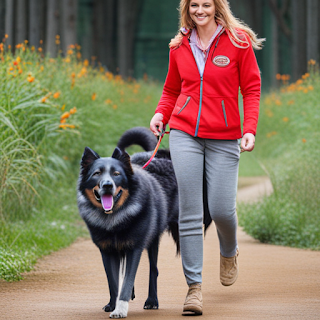Separation Anxiety Issues - What Can I Do to Help My Dog?
*Exercise him more. Go for more walks and throw the ball more often. Tired dogs are naturally less anxious. Give your dog at least 30 minutes of aerobic activity (for example, running and swimming) every day. Try to exercise your dog right before you have to leave him by himself. This might help him relax and rest while you’re gone.
*Make your departures and returns low key.
*Gradually lengthen periods of your absence. Leave him for short periods of time and gradually increase your time away from him. Give him time to adjust.
*Leave the radio or television on for him.
Leave your dog with plenty of toys or puzzle feeders to keep them occupied while you're away.
*Have a family member check in to visit if possible.
*Hire a dog sitter until he has had enough time to adjust to his routine.
* Create a safe space: Set up a cozy spot for your dog to retreat to when they're feeling anxious. This could be a crate, a dog bed, or even just a specific corner of the room.
What NOT to Do
Do not scold or punish your dog. Anxious behaviors are not the result of disobedience or spite. They are distress responses! Your dog displays anxious behaviors when left alone because he’s upset and trying to cope with a great deal of stress. If you punish him, he may become even more upset and the problem could get much worse.
A dog with separation anxiety becomes abnormally anxious when separated from his owner. The severity of the anxiety and the behavior the dog exhibits varies from animal to animal. Separation anxiety can result in problematic behaviors such as: whining, pacing, salivation, barking, howling, scratching, chewing, digging, urinating or defecating, or destroying personal items or household objects.
If you suspect your dog is suffering from severe separation anxiety, consult with your veterinarian to find the best method of treatment.
What NOT to Do
Do not scold or punish your dog. Anxious behaviors are not the result of disobedience or spite. They are distress responses! Your dog displays anxious behaviors when left alone because he’s upset and trying to cope with a great deal of stress. If you punish him, he may become even more upset and the problem could get much worse.
A dog with separation anxiety becomes abnormally anxious when separated from his owner. The severity of the anxiety and the behavior the dog exhibits varies from animal to animal. Separation anxiety can result in problematic behaviors such as: whining, pacing, salivation, barking, howling, scratching, chewing, digging, urinating or defecating, or destroying personal items or household objects.
If you suspect your dog is suffering from severe separation anxiety, consult with your veterinarian to find the best method of treatment.

